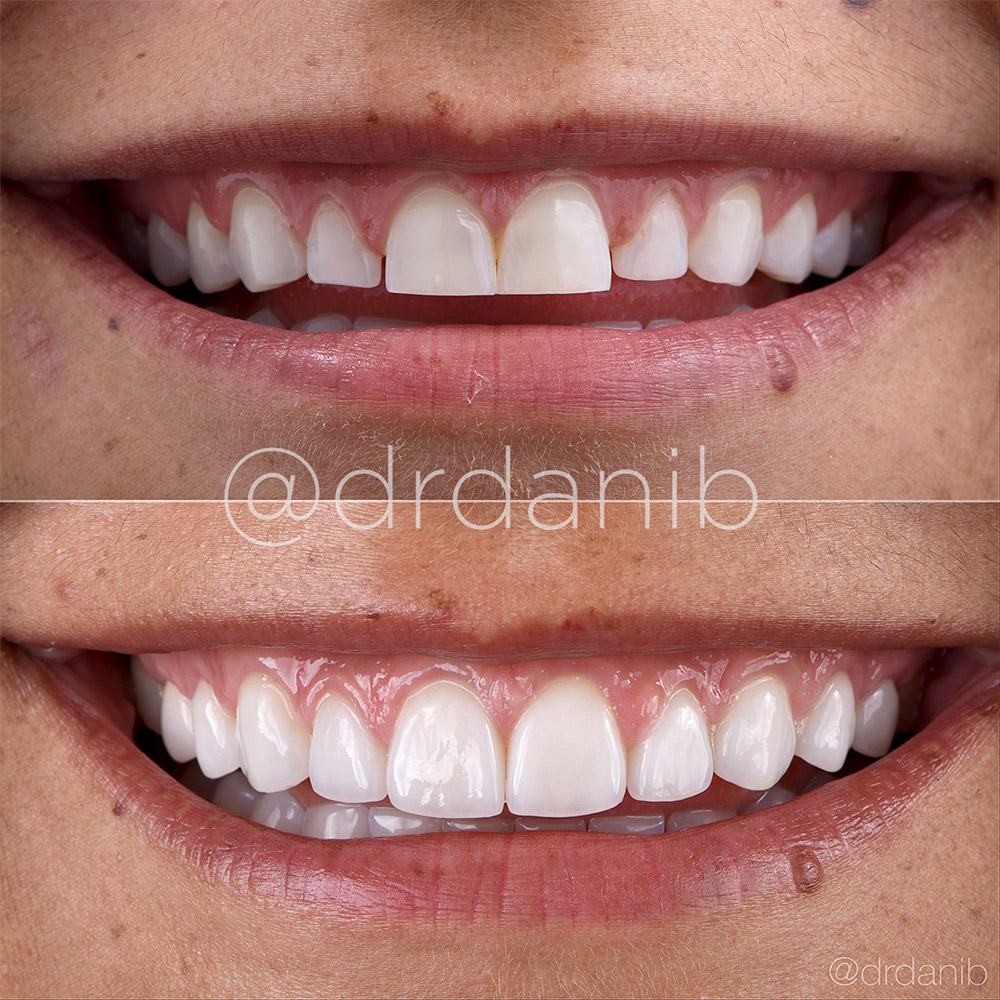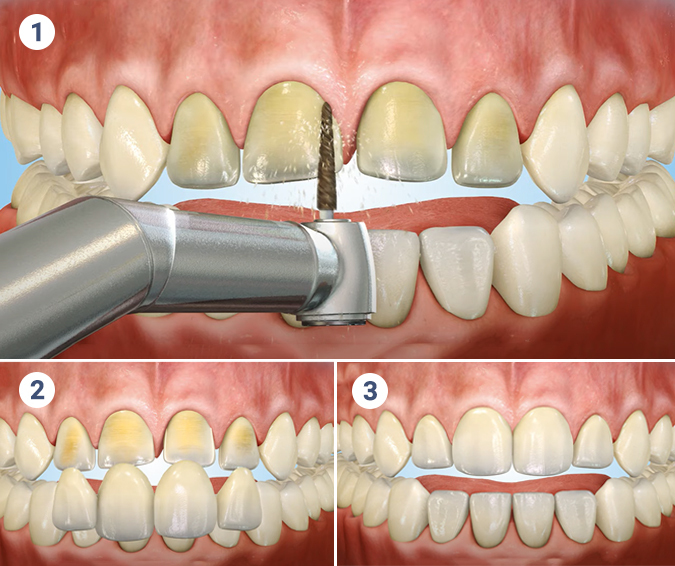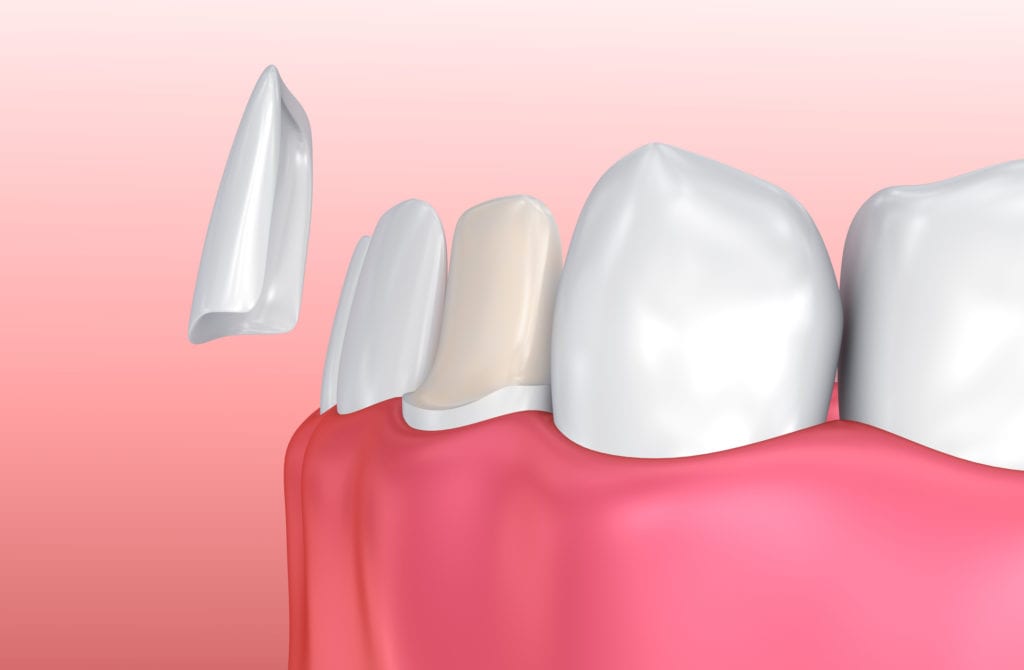Dental Veneers Cost, Procedure, and Aftercare Explained
Unlocking the Tricks of Veneers: Facts, Kinds, and Benefits for a Gorgeous Smile
Veneers use an engaging solution for those seeking to boost their smiles. These dental improvements can address numerous flaws, from discoloration to imbalance. With choices like porcelain and composite, people can choose based upon their choices and needs. Understanding the subtleties of veneers, including application and treatment, is important. What variables should one think about prior to choosing? The responses might amaze those thinking about this visual dental alternative.

Comprehending Veneers: What Are They?
Veneers are slim, tailor-made shells developed to cover the front surface area of teeth, enhancing their look. Typically crafted from durable products, these shells are tailored to fit each individual's teeth specifically. They serve numerous objectives, including dealing with aesthetic blemishes such as discoloration, chips, or gaps. The application procedure involves a dentist preparing the teeth, usually by eliminating a percentage of enamel to assure a tight fit. Once prepared, the veneers are bonded to the teeth utilizing a solid adhesive.
Individuals commonly pick veneers for their ability to produce a natural-looking smile while giving a resilient remedy to dental blemishes. Unlike other aesthetic dental care options, veneers require marginal invasive treatments, making them a popular choice. The outcome is an enhanced smile that can considerably increase an individual's confidence and self-confidence. Overall, veneers provide a reliable approach to accomplishing a much more appealing and unified dental appearance.
Kinds of Veneers: Porcelain vs. Composite
When thinking about cosmetic dental choices, two primary sorts of veneers stick out: porcelain and composite. Porcelain veneers are crafted from a sturdy ceramic product that imitates the all-natural appearance of teeth. They are recognized for their tarnish resistance and capability to show light similarly to all-natural enamel, giving a visual appeal that several clients wish. The application process generally involves more prep work of the tooth framework and might call for several brows through to the dental practitioner.
On the various other hand, composite veneers are made from a tooth-colored resin that is directly related to the teeth. This kind enables quicker application and can frequently be completed in a solitary check out. While they are less pricey than porcelain veneers, they may not provide the exact same long life or resistance to discoloration. Ultimately, the choice between porcelain and composite veneers depends upon private preferences, budget, and particular oral requirements.
The Advantages of Picking Veneers
Choosing veneers supplies various benefits that can significantly enhance both the visual appeals and functionality of an individual's smile. One of the primary benefits is their capability to remedy imperfections such as staining, spaces, and misalignment, resulting in an extra uniform look. Veneers can likewise enhance the resilience of teeth, providing a protective layer that shields them from damage.
Moreover, they need minimal tooth prep work compared to various other oral procedures, maintaining more of the all-natural tooth structure. This preservation adds to a healthier oral environment while still achieving a sensational smile.
Veneers are very customizable, allowing individuals to choose the shape, dimension, and color that ideal suits their preferences. Furthermore, they are stain-resistant, making it easier to maintain a appealing and bright smile gradually. Generally, veneers present an effective option for those looking for both aesthetic enhancement and long-term oral health benefits.
The Veneer Application Process
The veneer application process involves a number of vital steps to assure excellent outcomes. An examination is performed to evaluate the client's needs, followed by the prep work and shaping of the teeth. Lastly, the veneers are bonded in position, with changes created a best fit and look.
Preliminary Examination Tips
A detailed initial assessment is necessary for anyone thinking about veneers, as it sets the foundation for an effective treatment. Throughout this conference, the oral professional assesses the person's oral health and wellness, discussing any existing problems that might affect the veneer application. This evaluation may include X-rays and a visual examination to identify the condition of the teeth and gum tissues.
The dental practitioner also involves the person in a detailed discussion about their visual objectives, choices, and assumptions. They might offer numerous veneer choices customized to the individual's particular requirements. Furthermore, the professional explains the treatment, prospective threats, and aftercare demands, guaranteeing that the patient is educated and comfy prior to proceeding with the therapy.
Prep Work and Forming Teeth
After the first appointment, the following stage involves the prep work and shaping of the teeth to suit the veneers. This essential step is executed by the dental practitioner, who meticulously examines the tooth framework to figure out the amount of enamel that requires to be gotten rid of. Typically, a thin layer, normally around 0.5 millimeters, is slashed off to guarantee an appropriate fit for the veneers. Precision is extremely important throughout this process, as it affects both the general comfort and the aesthetic outcome. As soon as the teeth are effectively formed, impressions are taken to produce custom-made veneers that align perfectly with the client's oral profile. This careful preparation sets the stage for a successful veneer application, improving both look and function.
Bonding and Final Changes
Complying with the shaping and preparation of the teeth, the bonding process begins, marking an essential phase in the veneer application. Throughout this stage, an oral adhesive is related to the prepared tooth surface, guaranteeing a solid bond in between the tooth and the veneer. The dental professional carefully places the veneer, making modifications to attain the wanted placement and appearances. As soon as correctly placed, an unique light is utilized to cure the glue, strengthening the bond. After curing, the dentist performs final changes, cutting any excess material and fine-tuning the veneer's shape to assure a natural appearance. This mindful attention to information enhances both feature and aesthetics, adding to a general lovely smile that is sturdy and durable.
Taking care of Your Veneers: Maintenance Tips
Caring for veneers is vital to keep their appearance and durability. A consistent day-to-day cleaning routine, conscious avoidance of staining foods, and routine dental exams are crucial elements of reliable maintenance. These practices assist assure that veneers continue to be in peak problem and continue to enhance one's smile.
Daily Cleansing Routine
Regularly maintaining veneers is crucial for their longevity and look. A correct day-to-day cleaning routine can assist preserve their sparkle and avoid damage. Dental practitioners recommend brushing two times a day with a soft-bristled toothbrush and fluoride toothpaste, ensuring that all surfaces are cleansed delicately to stay clear of scratching the veneer surface. Flossing daily websites is additionally important to get rid of food particles and plaque from in between teeth, where brushes might not get to. Additionally, making use of an antimicrobial mouthwash can assist keep dental hygiene without hurting the veneers. It is advisable to avoid abrasive cleansers and tools that can scrape the veneer. By complying with these easy steps, people can keep their veneers looking gorgeous while promoting general oral health.
Preventing Discoloration Foods
Veneers are created to improve the look of teeth, their vulnerability to discoloring demands mindful nutritional options. It is essential for people with important link veneers to be mindful of specific foods and drinks that can bring about discoloration. Dark-colored products such as coffee, red wine, and berry juices need to be eaten in small amounts, as they are recognized to tarnish both all-natural teeth and veneers. In addition, acidic foods like citrus fruits can compromise the bonding representatives utilized in veneers, making them much more vulnerable to discoloration. To preserve an intense smile, it is recommended to rinse the mouth with water after taking in discoloration foods and to exercise normal dental health. These thoughtful options add considerably to the longevity and aesthetic appeals of veneers.

Normal Dental Examinations

Keeping the honesty of veneers calls for a commitment to regular oral exams, as these consultations play a necessary role in ensuring their longevity and appearance. During these sees, oral experts can examine the condition of the veneers, looking for any kind of indicators of wear, damages, or underlying oral issues. Additionally, regular cleansings help get rid of plaque and tartar that can gather around the veneers, advertising total dental wellness. Dental professionals can likewise offer personalized guidance on care strategies and products suited for veneer maintenance. By sticking to a timetable of examinations, people can deal with possible troubles early, guaranteeing their smile remains beautiful and lively. Inevitably, normal dental gos to are a critical component of veneer treatment.
Is Veneers the Right Choice for You?
Choosing whether veneers are the right option commonly pivots on individual oral needs and aesthetic goals. For those seeking to resolve problems such as staining, chips, or imbalance, veneers can offer a transformative option. Candidates normally include people with healthy teeth yet desire a boosted smile.
However, it is crucial to think about aspects such as tooth enamel condition, the extent of dental problems, and the willingness to keep veneers - Dental Veneers. Consulting with a dental specialist is important, as they can evaluate oral wellness and identify if veneers are appropriate
Furthermore, possible candidates ought to review the long-lasting dedication, as veneers might need replacement every 10-15 years. Expense considerations additionally play a significant function, as veneers can be a significant investment. Inevitably, the choice should be well-informed, balancing visual needs with practical considerations for enduring outcomes.
Frequently Asked Questions
How Much Time Do Veneers Typically Last Before Needing Substitute?
Veneers normally last in between 10 to 15 years prior to requiring substitute. Variables such as dental health, way of life selections, and material quality can affect their longevity, making routine dental examinations necessary for preserving their condition.
Are Veneers Safe for People With Delicate Teeth?
Veneers can be secure for people with sensitive teeth, yet it often depends on the severity of sensitivity and the dental professional's technique. Consulting an oral specialist prior to proceeding is vital to assure excellent results.
Can Veneers Be Removed or Changed Easily?

Do Veneers Spot In Time, and Exactly How Can I Avoid It?
Veneers can these details stain over time, especially from foods and beverages like coffee or red wine. To avoid staining, maintaining excellent oral hygiene, making use of a straw for drinks, and regular oral cleansings are advised methods.
What Is the Price Array for Getting Veneers?
The price of veneers typically varies from $500 to $2,500 per tooth, depending on factors such as material kind, dental professional experience, and place. Clients should talk to oral experts for customized quotes and funding options.
As soon as the teeth are properly formed, perceptions are taken to create personalized veneers that straighten perfectly with the client's oral account. During this phase, an oral adhesive is used to the ready tooth surface area, assuring a solid bond between the veneer and the tooth. It is important to take right into account variables such as tooth enamel problem, the extent of oral problems, and the willingness to maintain veneers. Veneers can be risk-free for people with sensitive teeth, yet it typically depends on the seriousness of sensitivity and the dental practitioner's method. The cost of veneers typically ranges from $500 to $2,500 per tooth, depending on variables such as product kind, dental expert experience, and location.